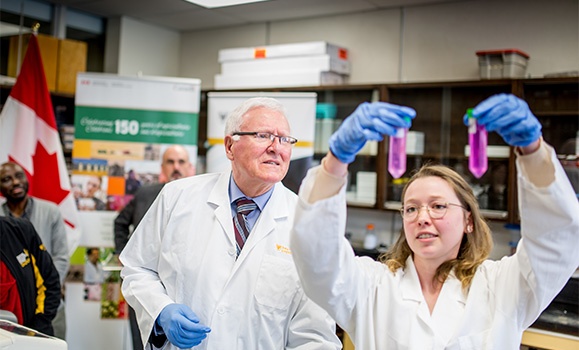Faculty of Agriculture researchers are well on their way to helping the Canadian farming sector become a world leader in the development and use of clean and sustainable agricultural technologies and practices.
On Friday, April 21, on the eve of Earth Day, Member of Parliament Bill Casey (Cumberland—Colchester) announced a $1.7 million investment to develop technologies, practices and processes that can be adopted by farmers to reduce greenhouse gas (GHG) emissions.
This project is among 20 projects being delivered through the $27 million (AGGP), a science-based program to help the agricultural sector adjust to climate change and improve soil and water conservation by developing new farming practices and methods. It also will help farmers increase their understanding of GHG emissions.
‚ÄúFor decades, the Agricultural Campus has led the way in agricultural innovation and rural economic development,‚Äù Bill Casey, Member of Parliament for Cumberland-Colchester.¬Ý ‚ÄúAVæ„¿÷≤ø‚Äôs Faculty of Agriculture continues its leadership in tackling climate change and now with this investment from our government into their valuable project, they will be able to do even more. This is good news for both farmers and the environment, which we all depend on to sustain our livelihoods.‚Äù
Success through partnership
Faculty members David Burton and Derek Lynch at the Faculty of Agriculture are working directly with the agricultural community to assess soil health, carbon storage capacity and soil nitrogen supply as a basis for greenhouse gas mitigation planning.
This research will go a long way to increase the resiliency of Atlantic Canadian soils to climate change and extreme weather events which will be of broad benefit to the agriculture sector across Canada.
‚ÄúThe Federal Government‚Äôs Advisory Council on Economic Growth recently released the Barton Report focussed on the growth potential of key sectors,‚Äù explained Dr. David Gray, dean of the Faculty of Agriculture and principal of the AVæ„¿÷≤ø Agricultural Campus.¬Ý
‚ÄúIn this report, the Federal government aspires to global leadership in agri-food such that Canada will become the trusted global leader in safe, nutritious and sustainable food for the 21st century.¬Ý The Faculty of Agriculture is proud to work with our government toward this vision through our leading edge teaching and research.‚Äù
The new AGGP investments will continue to support the work of the Global Research Alliance on Agricultural Greenhouse Gases, which brings together 47 countries to find ways to grow more food without growing greenhouse gas emissions.
‚ÄúThis funding provides a wonderful opportunity to work with the Atlantic agricultural industry and provincial partners to improve our understanding of which soil, fertility and crop management approaches best contribute to climate change mitigation and adaptation,‚Äù explained Dr. Lynch.¬Ý ‚ÄúIt also provides for a unique soil health laboratory facility and helps us train the next generation of researchers in soil science and agronomy, to contribute to these important goals.‚Äù

